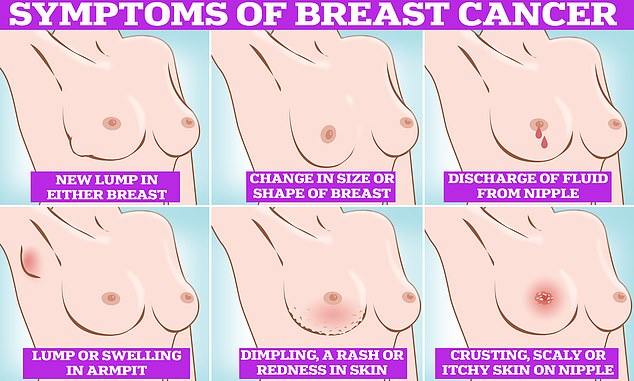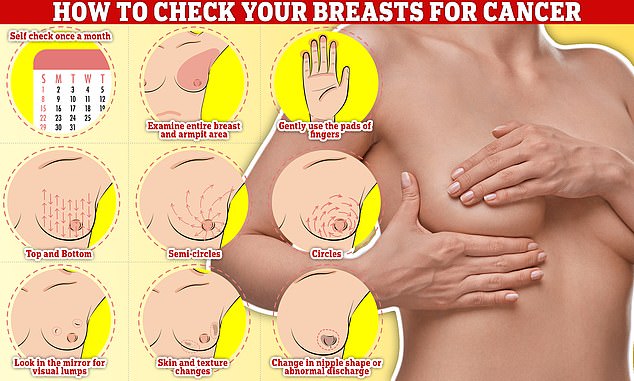Thousands of cases of breast cancer could be prevented each year if women drank less alcohol and breastfed more, a major report warns today.
One in four cases in the UK are due to “modifiable risk factors”, which could be reduced with lifestyle changes.
Almost one in 20 – around 2,600 cases – are linked to low rates of breastfeeding and one in 10 to alcohol consumption, according to research by the Lancet Commission.
While “tremendous advances” in research and treatments have reduced mortality rates, bold policy action is now needed to promote better lifestyles, he said.
Checking your breasts should be part of your monthly routine so that you notice any unusual changes. Simply rub and feel up and down, feeling in semicircles and in a circular motion around the breast tissue to detect any abnormalities.
The latest figures show that there are 55,900 new cases of the disease each year, with around 11,500 deaths.
The Commission, led by the University of Cambridge, studied the diagnosis, treatment and experiences of women diagnosed with the world’s most common cancer.
In high-income countries, including the UK, there were more cases of preventable diseases, caused by factors such as a sedentary lifestyle and obesity.
Experts estimate that 4.7 per cent of UK cases are linked to women not breastfeeding, which is known to reduce the risk of disease by four per cent for every 12 months spent doing so.
The World Health Organization (WHO) recommends exclusive breastfeeding for the first six months of a baby’s life.
However, the UK has one of the lowest breastfeeding rates in the world, with only one in 200 women continuing to breastfeed beyond 12 months.
Ministers have been urged to implement policies that encourage breastfeeding, such as ensuring “supportive work environments” where mothers can breastfeed or express milk.
Elsewhere, researchers found that those who drink a small glass of wine a day are nine percent more likely to get breast cancer than non-drinkers, rising to 60 percent among the heaviest drinkers.
Authorities should consider applying smoking-style alcohol warnings or following Scotland’s lead with minimum pricing, he suggests, blaming it for about one in ten cases.
This follows a recent report from the Organization for Economic Co-operation and Development (OECD) suggesting that British women are the biggest binge drinkers in the developed world.
One in four regularly drinks more than six drinks in a single drinking session, despite the increased risk of heart disease, stroke, liver cirrhosis and certain types of cancer.
The Commission found that between eight and 13 per cent of breast cancer cases in the UK are due to obesity, which increases the risk of breast cancer in postmenopausal women.

Breast cancer symptoms to look out for include lumps and swelling, dimpling of the skin, color changes, discharge, and rash or scabs around the nipple.
The percentage of breast cancer attributable to hormone replacement therapy and hormonal contraceptives in the United Kingdom is 2.1 percent and 0.8 percent respectively, it added.
Dr Simon Vincent, director of research, support and influence at Breast Cancer Now, said several factors play a role, including genetics, lifestyle and environment.
He said: “Although we can’t predict who will get breast cancer, we know that prevention is our best weapon against the disease and there are some things people can do to reduce their risk of getting it.”
‘The Lancet Breast Cancer Commission report highlights that many cases of breast cancer are preventable, but not enough people know about the modifiable risk factors and the steps they can take to minimize their chances of developing the disease. .
‘These include reducing alcohol consumption, maintaining a healthy weight and staying physically active.
“It is vital that women are supported to make healthy lifestyle changes that can have a positive impact on their health and help reduce their risk of breast cancer.”


